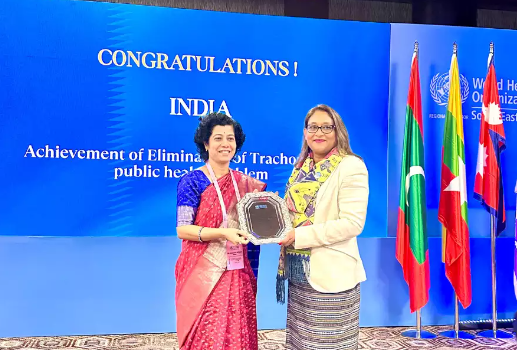WHO Honors India for Eliminating Trachoma as Health Problem
The World Health Organization (WHO) recently praised India for successfully eliminating trachoma as a public health issue. This makes India the third country in the Southeast Asia Region to achieve this, following Nepal and Myanmar.
Significance of the Achievement
The WHO’s recognition shows that India has made a strong effort to improve eye health and prevent diseases through its health programs. Trachoma, a disease that was once a major cause of blindness worldwide, has now been brought under control in India.
What is Trachoma?
Trachoma is a bacterial infection that affects the inner lining of the eyelids, and it is often linked to poor hygiene and bad environmental conditions. In the past, especially during the 1950s and 60s, it was a major cause of blindness in India.
Government Initiatives
India started the National Trachoma Control Program in 1963. This program was later merged with the National Programme for Control of Blindness. Thanks to these efforts, the percentage of blindness caused by trachoma dropped from 5% in 1971 to less than 1% today.
WHO’s SAFE Strategy
To fight trachoma, India used the WHO’s SAFE strategy, which stands for:
- Surgery to correct eyelid problems caused by trachoma.
- Antibiotics to treat the infection.
- Facial cleanliness to prevent the disease from spreading.
- Environmental hygiene to improve living conditions.
This strategy helped India get rid of infective trachoma by 2017.
Ongoing Surveillance and Research
Since 2019, India has been keeping a close watch to ensure trachoma does not come back. The National Trachomatous Trichiasis Survey (2021-2024) is being conducted to confirm that the disease remains under control.
Health Outcomes
In 2021, more than 69,000 people received surgical treatment, and around 64.6 million people were treated with antibiotics to fight trachoma. These efforts have greatly reduced the number of people affected by this disease, leading to better health outcomes across the country.
Month: Current Affairs - October, 2024
Category: India Nation & States Current Affairs








